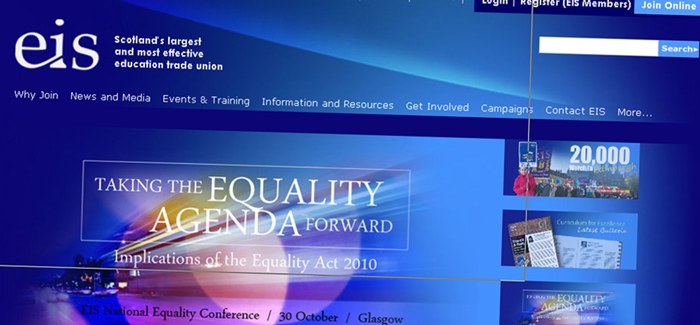A former president of the EIS who tried to take the union to an employment tribunal for disciplinary procedures taken against him has voiced his disappointment after his appeal was rejected.
He said Mr Quigley had made a number of allegations about the EIS, in relation to his own resignation as an office-bearer, financial and accounting procedures within the EIS, and the manner in which complaints against him by other members were dealt with by the EIS and the certification officer when considering his complaint.
“The EIS complies with all relevant legislation governing the work of trade unions, and operates in line with its own rules and regulations under its royal charter.
“All EIS accounting procedures are subject to professional audit, and all salary negotiations for EIS staff are conducted via established collective bargaining procedures between the EIS as the employer and the recognised employee trade unions.
“All financial matters are fully reported through the EIS executive and national council and a full set of financial accounts is subject to scrutiny and approval of EIS members at the annual general meeting.
“Details of EIS accounts, including the salary of the general secretary, are also published each year in the EIS magazine, the Scottish Educational Journal, and sent to all members.”
He also said the salary agreement between the EIS and its officials, including the general secretary, linked any annual salary awards for officials to the salary awards of teachers.
Responding to the EIS statement, Mr Quigley said Mr Cockburn’s judgment was restricted to deciding whether the EIS’s treatment of him breached the EIS constitution.
“He was debarred by law from considering whether or not it was fair and did not rule on that,” he said. “He decided that if the Ronnie Smith and the EIS wanted to claim that my letter, deploring the waste of £43,700 of members’ money and carrying my home address at the top right hand corner, was fabricated to look like an EIS document, that was not unconstitutional.
“If the EIS wanted to claim that their all-graduate members could not tell the difference between a letter sent from me in Kinghorn in Fife and an official letter sent by Mr Smith from Edinburgh, that was not unconstitutional.
“If the EIS wanted to claim, even after 20 months without an incident, that Scotland’s headteachers were sufficiently unethical to use the information ‘to the detriment of the EIS and its members’ that was not in breach of the EIS constitution.”
Mr Quigley said he accepted that he was found guilty of disrupting an EIS executive meeting but pointed out that the chairwoman of the meeting, Kirsty Devaney, was also chairwoman of the disciplinary committee, while the vice chairman of the executive, David Drever, who is now the convener of GTC Scotland, was the chairman of the appeals committee.
“However strongly I might feel that this breached all standards of natural justice I was told it was not unconstitutional. According to a recent report in Fife, the EIS have now spent in the region of £70,000 of members’ money, around £22,000 on preparing the case to the certification officer in April 2010,” he added.
Peter Quigley, who was EIS president from 2006-7, claimed decisions made by the union’s disciplinary committee breached his human rights.
The former office-bearer, from Kinghorn, had been attempting to overturn a decision by the government-appointed trade union certification officer which completely rejected a number of allegations that Mr Quigley had made about the EIS.
However, the presiding appeal tribunal judge, Lady Smith, reaffirmed her earlier ruling that there was no legal basis for Mr Quigley’s appeal.
Mr Quigley is banned from holding any elected office in the organisation after he was stripped of office and prevented from attending the union’s meeting in Perth in June 2009.
The EIS had previously taken legal action against him preventing him from attending two meetings of the EIS council in 2008, as an internal investigation into complaints he had made was carried out.
He criticised EIS policy that the salary of general secretary Ronnie Smith must be linked to that of Scottish head teachers and that he must be paid at least 12% more than the highest-paid head teacher in Scotland.
He also frequently alleged that salary increases to Mr Smith and his officials were never properly authorised by the EIS council nor recorded on any EIS minute. Mr Quigley questioned whether this breached the EIS constitution and trade union law.
He wrote to members criticising the money spent by the union on legal fees as it moved to bar him from the meetings in 2008, and claimed he was accused by the EIS of fabricating his letter to look like an official EIS document which he still denies.
Mr Quigley said he was also disciplined for threatening to write to the Queen alleging breaches of the EIS’s royal charter.
At a hearing last year, the trade union certification officer David Cockburn ruled the EIS had been correct to bring disciplinary procedures against Mr Quigley and to find him guilty of fabricating his letter.
An EIS spokesman said, “The EIS notes the decision of the employment appeal tribunal judge that Mr Quigley’s appeal has no basis in law. This decision reaffirms the previous decision not to progress the appeal and the decision of the trade union certification officer in relation to Mr Quigley’s allegations against the EIS.”
